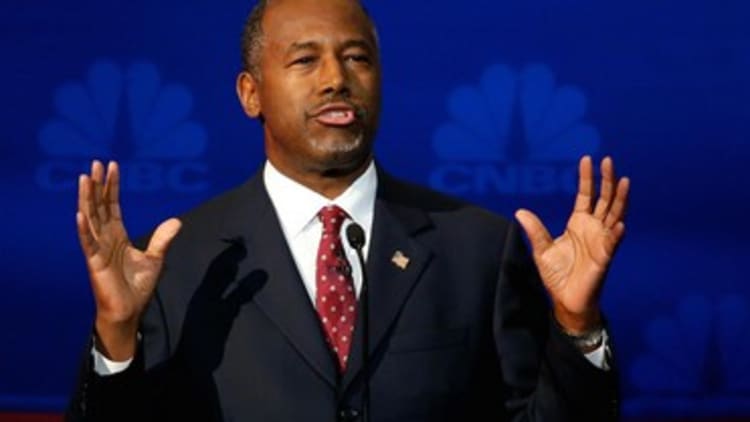
The 2016 presidential election is now one year away — and it's already close.
The latest NBC News/Wall Street Journal poll shows each party with formidable strengths as Democratic and Republican primary voters begin to get serious about selecting their presidential nominees.
In their front-runner Hillary Clinton, Democrats have the strongest political name brand in the contest. The former first lady, senator and secretary of state holds a huge lead over Sen. Bernie Sanders of Vermont, the self-described Democratic socialist who is her chief rival. Three months before delegation selection begins in the Iowa caucuses, she draws 62 percent support among Democrats nationally to 31 percent for Sanders and 3 percent for Martin O'Malley, the former governor of Maryland.
The Republican field is far more fluid and unpredictable. It has a new leader, former pediatric neurosurgeon Ben Carson, who has now passed real estate magnate Donald Trump. Carson draws 29 percent among Republicans nationally to 23 percent for Trump. The more traditional office-holding candidates lag significantly behind: Sen. Marco Rubio of Florida with 11 percent, Sen. Ted Cruz of Texas with 10 percent, former Gov. Jeb Bush of Florida with 8 percent.
The telephone survey of 1,000 adults, conducted Oct. 25-29, carries a margin for error of 3.1 percentage points for the entire sample, and 4.9 percentage points for the subsets of Democratic and Republican primary voters.
In an era of steady but slow economy recovery, voters in both parties express frustration. A 54 percent majority agrees that "the economic and political systems in the country are stacked against people like me," while just 41 percent disagree.
How that discontent shapes voter preferences as next spring's primary contests give way to next summer's nominating conventions and next fall's election homestretch remains far from clear.
Democrats enter the contest with a stronger party image. Voters are decidedly lukewarm on President Barack Obama's party; 41 percent express a positive view, 39 percent a negative view. But they're sharply unfavorable about the GOP, with 29 percent expressing positive views and 44 percent negative.
At the same time, Republicans benefit from desire for change. The survey shows Obama with a middling job approval rating, as the 49 percent who disapprove his performance exceeds the 45 percent who approve.
History shows it is difficult for political parties to win three consecutive presidential terms. Since World War II, only a Republican accomplished the feat when President George H.W. Bush won the 1988 election after Ronald Reagan's two terms in the White House.
The bottom line: with one year until voters go to the polls to select a president, 44 percent now say they want the eventual Republican nominee to win while 43 percent say they prefer the eventual Democratic nominee.



